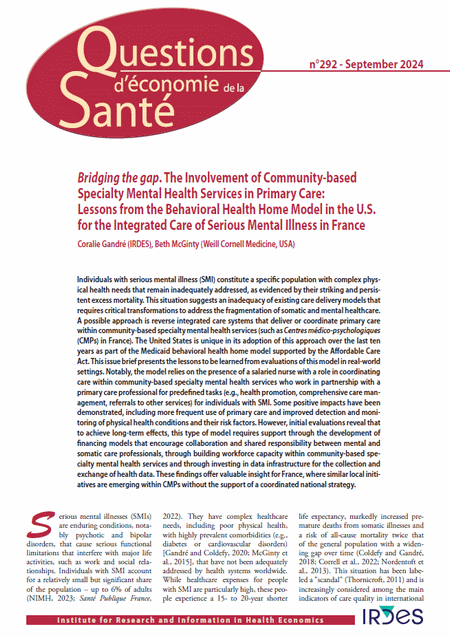Bridging the Gap. The Involvement of Community-based Specialty Mental Health Services in Primary Care: Lessons from the Behavioral Health Home Model in the U.S. for the Integrated Care of Serious Mental Illness in France
Gandré C. (IRDES), McGinty B. (Weill Cornell Medicine, USA)
Questions d'économie de la santé (Issues in Health Economics) n° 292 - September 2024
ABSTRACT
Individuals with serious mental illness (SMI) constitute a specific population with complex physical health needs that remain inadequately addressed, as evidenced by their striking and persistent excess mortality. This situation suggests an inadequacy of existing care delivery models that requires critical transformations to address the fragmentation of somatic and mental healthcare. A possible approach is reverse integrated care systems that deliver or coordinate primary care within community-based specialty mental health services (such as Centres médico-psychologiques (CMPs) in France). The United States is unique in its adoption of this approach over the last ten years as part of the Medicaid behavioral health home model supported by the Affordable Care Act. This issue brief presents the lessons to be learned from evaluations of this model in real-world settings. Notably, the model relies on the presence of a salaried nurse with a role in coordinating care within community-based specialty mental health services who work in partnership with a primary care professional for predefined tasks (e.g., health promotion, comprehensive care management, referrals to other services) for individuals with SMI. Some positive impacts have been demonstrated, including more frequent use of primary care and improved detection and monitoring of physical health conditions and their risk factors. However, initial evaluations reveal that to achieve long-term effects, this type of model requires support through the development of financing models that encourage collaboration and shared responsibility between mental and somatic care professionals, through building workforce capacity within community-based specialty mental health services and through investing in data infrastructure for the collection and exchange of health data. These findings offer valuable insight for France, where similar local initiatives are emerging within CMPs without the support of a coordinated national strategy.
See also Questions d'économie de la santé n° 292 in French: Bridging the gap. L'implication de structures de santé mentale ambulatoires dans les soins primaires aux Etats-Unis : enseignements pour une prise en charge intégrée des troubles psychiques sévères en France
